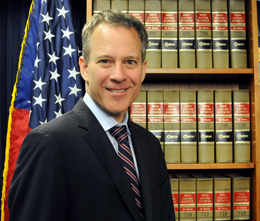 Five AGs Tell Trump Administration It Cannot Delay Rule That Would Reduce Emissions And Pollution And Save Consumers Money
Five AGs Tell Trump Administration It Cannot Delay Rule That Would Reduce Emissions And Pollution And Save Consumers Money
Rule Would Encourage Automakers To Meet Or Exceed Fuel Efficiency Standards, Which Would Reduce Carbon Emissions By 1.8 Billion Metric Tons And Save Each Consumer $1,650
Leading a coalition of five attorneys general, New York Attorney General Eric T. Schneiderman filed a lawsuit against the Trump Administration for illegally delaying a rule that encourages automakers to produce vehicle fleets that meet or exceed federal fuel efficiency standards.
Set to take effect in July 2017, the rule would increase the penalty imposed on automakers whose vehicle fleets do not meet minimum fuel efficiency standards. All federal agencies were required to increase their civil penalty rates by an act of Congress, the 2015 Federal Civil Penalties Inflation Adjustment Act. In response, the U.S. Department of Transportation issued a new rule to increase the penalty by $8.50 per tenth of a mile per gallon. The Trump Administration has delayed it, reverting back to the lower penalty rate instead. If the penalty is not sufficiently high, automakers lack a vital incentive to manufacture fuel efficient vehicles.
“Fuel efficiency standards are common sense, protecting Americans’ pocketbooks and reducing the emissions that undermine public health and drive climate change,” Schneiderman said. “Yet again and again, the Trump administration sides against New Yorkers and our environment. State Attorneys General have made clear: we won’t hesitate to act when those we serve are put at risk.”
Click here to read the lawsuit, which was led by Schneiderman and California Attorney General Xavier Becerra, and filed by New York, California, Vermont, Maryland, and Pennsylvania. In a similar petition, the Natural Resources Defense Council, Sierra Club, and the Center for Biological Diversity are also challenging the Trump administration’s illegal delay.
The penalties provide increased incentive for auto manufacturers to achieve the Corporate Average Fuel Economy Standards for upcoming model years. The standards – for model years 2016 through 2025 – would save approximately 1.8 billion metric tons of carbon dioxide emissions over the lifetimes of the vehicles sold. The Augural Standards (model years 2022 through 2025) alone would reduce carbon dioxide emissions by 40 million tons a year in 2025, and by over 200 million tons a year in 2050, compared to indefinitely maintaining the 2021 standards.
The Environmental Protection Agency has previously estimated that the Augural Standards would also lead to an annual reduction of 13,000 tons of NOx emissions and of 2,000 tons of particulate matter emissions nationwide by 2030. A consumer would save a net $1,650 with a model year 2025 vehicle that adheres to the Augural Standards, compared to one that complies with the model year 2021 standards. These impacts are described in a National Highway Traffic Safety Administration (NHTSA) fact sheet.
As the lawsuit details, on December 28, 2016, the NHTSA announced a rule that increased the penalty rate for violating fuel efficiency standards by $8.50, from $5.50 per tenth of a mile per gallon to $14 per tenth of a mile per gallon; however, July 12, 2017, NHTSA announced it was indefinitely delaying the effective date of its updated penalty. This is unlawful in two ways. First, NHTSA acted without notice and without taking comment, which violates the Administrative Procedure Act. Second, this arbitrary delay reinstates the outdated $5.50 penalty rate, which violates the 2015 Federal Civil Penalties Inflation Adjustment Act.

